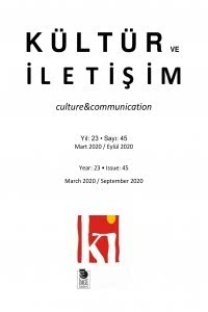Coğrafya, Kültür ve Siyaset: Suriye'de Esad Rejimini Biçimleyen Koşullar ve Etmenler
Arap Orta Doğu'sunda siyasal yapı analizlerinde kültür boyutu üzerinde yeterinc'e durulduğu söylenemez. Ancak bu boyutun bölgede özellikle bütünlüklü ulus-devletlerin inşası yolundaki girişimlerde karşılaşılan güçlükleri anlamak açısından büyük öneme sahip olduğu açıktır. Suriye bu bakımdan iyi bir örnek teşkil etmektedir. Suriye'nin yakın dönem siyasal tarihi hizipçi eğilimler temelinde gelişen iktidar mücadeleleri ile karakterize edilebilir. Söz konusu eğilimler "birincil bağlılıklar"dan köken alırlar. Suriye'nin Emevi döneminden beri bağımsız bir siyasal varlığa sahip olma yönünde tarihsel deneyimsizliği, birincil bağlılıkların insanların bilincinde yerinden edilemezliği, Suriye. Irak, Mısır vb. kimlikleri kapsayarak kendi içinde eriten bir "aşkın" Arap kimliğinin varlığı ve Suriye içinde mevcut bölgecilik eğilimleri. ülkede bütünlüklü ve istikrarlı bir siyasal sistemin biçimlenmesini engelleyen edenlerdir. Hafız el-Esad'ın başarısı. başlangıçta hizipçi olmayan bir siyaset izleyip halk desteğini sağlamasına, giderek kendisine bağlı bir güvenlik birimi oluşturmasına ve ülkedeki tüm toplumsal ve ekonomik aynaklara erişim imkanı veren bir devlet patronajını kurumlaştırmasına. gerektiğinde de toplum üzerinde geniş çaplı devlet şiddeti uygulamaktan kaçınmamasına dayanmaktadır.
Geography, Culture and Politics: A Background to Hafız al-Assad's Regime in Syria
The analyses of political structures in the Arabic Middle East have by now largely overlooked the dimension of culture. Yet this dimension is crucial particularly for marking the difficulties encountered inthe attempts to establish well-integrated nation-states in the region. Syria is a case in point. The political process in Syria has been influenced by the factors related to the domain of "culture". Recent political history of Syria can be depicted asa power struggle based on sectarian tendencies. These tendencies tem from the "primordial loyalties". Historical inexperience otSyria to become an independent political unit since the time ot the Umayyad Dynasty, indispensability otprimordial loyalties in the consciousness ot people, the existence ot transcendental Arab identity which crosscuts ali territorially separate ideliltitiesuch as Syrian. lraqi, Egyptian. ete., and tinally regionalist preferences within Syria. ali appeared as obstacles to shaping an integrated and stable political system in this country. Hafız al-Assad is the only leader who, has succeded to establish a sustaining rule in Syria. He has managed this first by introducing apolitical and economic relaxation, by avoiding sectarianism instate machinery --military excluded--and, later. by creating a security force which is loyal to himselt and formed by his close relatives and, tinally, by institutionalising a state oatronage through which access to ali social and ecönomic tacilities is possible in the country
___
Alankary, H. (1989). "Prac!.ical Ba'athism. 1963-82." Yayımlanmamış Makale. . Londra: Londra Universitesi, Doğu ve Afrika Çalışmaları Okulu (SOAS).Al-khalil, S. (1989). Repub/ic of Fear. The Po/itics of Modern /raq. . Berkeley: University of California Press.
Bar-Siman-Tav, Y. (1983?. Linkage Politics in the Middle East. Syria Between Domestic and External Conflıct 1961-7970. Boulder: Westview Press.
Batatu, H. ( 1981 ). "Some Observations on the Social Roots of Syria's Ruling Military Group and the Causes for its Dominance." Middle East Journal. Vol. 35, No. 3: 331-334.
Cihansız, Y. (1995). "Gap ve Türkiye-Suriye ilişkileri." Strateji. 95/3: 153-170,
Dann, U. (1984). Studies in the History of Transjordan. · 1920-1949. ,' _Landon: Westview Press.
Giritli, İ. (1978). Bugünkü Orta Doğu'nun Önemli Sorunları. _ lstanbul: İİTİA. Nihad Sayar-Yayın ve Yardım Vakfı Yayınları.
Hinnebusch, R.A. ( 1984). "Syria: The role of ideology and party organization in local devel?pment." Loca/ Politics and Deve/opment in the Midd/e East. L.J. cantori ve 1. Harık. Boulder (der.) içinde. Westview Press.
Hiro, D. (1989). lslamic Fundamenta/isrrı. Landon: Paladin.
Hopwood, D. (1988). "Syria 1915-1986." _Politics and Society. Lond.on: Unwin Hyman.
Kelidar, A. (1971 ) .. "~yrian Arab Republic." The Middle East M. Adams (der.) içinde. Great Brıtaın: Anthony Blond Ltd.
Kienle, E. (1990). Ba'th v. Ba'th - The Conflict Between Syria and /raq. 1968-1989. Landon: I.B. Tauris.
Ma'oz, M. (~ 972). "Attempts at Creating a Political Community in Modern Syria." . Mıddle East Journal. Vol. 26.
Ma'oz, M. (1988). Asad-The Sphinx of Damascus. Landon: Weidenfeld and. Nicholson.
Ma'oz, Z. (1986). "The Evolution of Syrian Power. 1948-1984." Syria under Assad M. Ma'oz ve A. Yaniv (der.) içinde. Landon: Croom Helm.
Odeh, B.J. (1986). Lübnan'da İç Savaş. Çev. Y. Alogan. İstanbul: Belge.
Olsan, R. W. ( 1982). The Ba 'th and Syria 1947 to 1982 - The Evolution of /deology, Party and Sta_te. Princeton: Kingston Press. '
Sadowski, Y.M. (19_88). "Ba'thist Ethics and the Spirit of State Capitalism. Patronage and the Party ın Contemporary Syria." ldeology and Power in the Middle East P.J. Chelkowski ve R.J. Pranger (der.) içinde. London: Duke University Press.
Seale, P. (1987). The Strug~le for Syria -A Study of Post:War Arab Politics. London: I.B. Taurıs.
Sluglett, M.F ve P Sluglett (1987) Iraq Since 1958 - From Revolution to Dictatorship. London: KPI.
Springborg, R (1981) "Baathism in Practice: Agriculture, Politics, ar;ıd Political Culture in Syria and lraq." Middle Eastern Studies. Vol. 17, No. 2: 191-209.
Suleiman, M.W. ve K.E. Koehn (1970) "Syria" Governments and Politics of the Contemporary Middle East T. Y lshmael (der) içinde. Ontario: The Dorsey Press.
Van Dam, N. (1979). The Struggle for Power in Syria. London: Croom Helm.
Van Dusen, M H ·(1972) "Political lntegration and Regionalism in Syria." Middle East Journal. Vol. 26, No. 2: 123-136.
- ISSN: 1301-7241
- Yayın Aralığı: Yılda 2 Sayı
- Başlangıç: 1998
- Yayıncı: İmge Kitabevi Yayınları
Sayıdaki Diğer Makaleler
Behice Boran 'ın İletişim Alanına Katkıları
Teknik, Teknoloji ve "Miınari" Yaratıcılık Bina Üretimine Dair Birkaç Olay ve Örnek
Coğrafya, Kültür ve Siyaset: Suriye'de Esad Rejimini Biçimleyen Koşullar ve Etmenler
Modernin "Yasası" Olarak Kamp: Şiddet ve Politika Uzerine Bir Değerlendirme
Güney Kore'nin Kalkınmasında Kültür ve Devlet - State and Culture in South Korean Development
